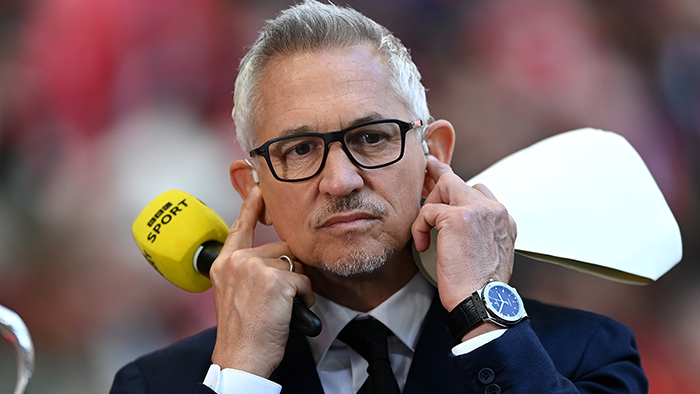Former England soccer captain Gary Lineker has been taken off air by the BBC after his comments on Britain's migration policy sparked a furious row between the government and the corporation's highest paid presenter.
Lineker was told there has to be an agreed position on his use of social media before he can return, the BBC said on Friday, with Director General Tim Davie saying it had taken a "proportionate action".
The row overshadowed a migration deal struck between British Prime Minister Rishi Sunak and French President Emmanuel Macron, with the BBC accused of bowing to political pressure.
"Gary Lineker off air is an assault on free speech in the face of political pressure," the opposition Labour party said, calling for the BBC to re-think its decision.
Scotland's First Minister Nicola Sturgeon called the BBC's move "indefensible".
The Department for Culture, Media and Sport said: "Individual cases are a matter for the BBC."
NEW LAW
On Tuesday, Britain announced details of a new law which would see migrants arriving in small boats across the Channel prevented from claiming asylum and deported either back to their homeland or to so-called safe third countries.
It drew criticism from opposition parties, charities and the U.N.'s refugee agency for its impact on genuine refugees.
Lineker, who has previously hosted refugees in his home, retweeted a post featuring a video of interior minister Suella Braverman talking about the law, with the comment "Good heavens, this is beyond awful".
Challenged by a respondent, he said: "This is just an immeasurably cruel policy directed at the most vulnerable people in language that is not dissimilar to that used by Germany in the 30s, and I'm out of order?"
Lineker faced a backlash to his comments, which were criticised by Sunak's spokeswoman as "not acceptable", but said he would "continue to try and speak up for those poor souls that have no voice".
The BBC said after talks with Lineker and his team that it had decided he would step back from presenting its flagship Match of the Day (MOTD) soccer highlights programme "until we've got an agreed and clear position on his use of social media".
The Bectu union, which represents thousands of BBC workers, said the corporation's move was "deeply concerning".
After four of the show's regular pundits, former England players Ian Wright, Alan Shearer, Jermaine Jenas and Micah Richards said they did not wish to appear on the programme without Lineker, the BBC said Saturday's edition would "focus on match action without studio presentation or punditry."
MOTD commentator Steve Wilson later tweeted that the show's commentators had also pulled out from Saturday's broadcast, leaving BBC management reliant on World Feed commentary.
BREACH OF GUIDELINES
Lineker has hosted MOTD for over 20 years and the charismatic 62-year-old has never been afraid to voice his opinions about political issues.
But the BBC said it considered his recent social media activity to be a breach of its guidelines.
"We have never said that Gary should be an opinion free zone, or that he can’t have a view on issues that matter to him, but we have said that he should keep well away from taking sides on party political issues or political controversies," it added.
The BBC, funded by what is in effect a 159 pounds ($192)annual “license fee” tax on all television-watching households, has a central presence in British cultural life. It says it is committed to being politically impartial.
Lineker, who played for clubs including his home town Leicester City, Everton, Tottenham Hotspur and Barcelona, is the BBC's highest paid personality, earning more than 1.3 million pounds in 2021/22. He is yet to comment on his suspension.
Last year the BBC's complaints unit ruled Lineker had failed to meet editorial standards on impartiality when he sent a tweet asking whether the governing Conservative Party would give back money from Russian donors.
BBC Chair Richard Sharp is under pressure for failing to declare his involvement in facilitating a loan for former Prime Minister Boris Johnson shortly before he was appointed to the role. His appointment, made on the recommendation of the government, is now being reviewed by Britain's public appointments watchdog.
Source: BBC






